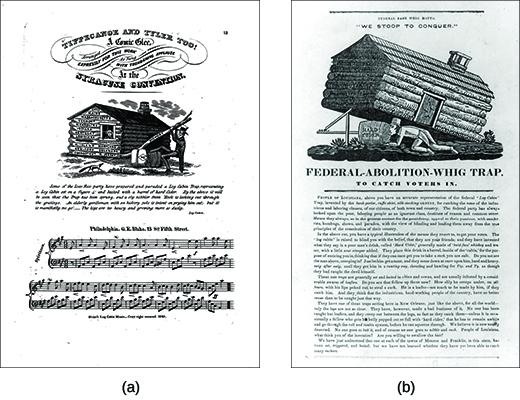| << Chapter < Page | Chapter >> Page > |
Take the Alexis de Tocqueville Tour to experience nineteenth-century America as Tocqueville did, by reading his journal entries about the states and territories he visited with fellow countryman Gustave de Beaumont. What regional differences can you draw from his descriptions?
The presidential election contest of 1840 marked the culmination of the democratic revolution that swept the United States. By this time, the second party system had taken hold, a system whereby the older Federalist and Democratic-Republican Parties had been replaced by the new Democratic and Whig Parties. Both Whigs and Democrats jockeyed for election victories and commanded the steady loyalty of political partisans. Large-scale presidential campaign rallies and emotional propaganda became the order of the day. Voter turnout increased dramatically under the second party system. Roughly 25 percent of eligible voters had cast ballots in 1828. In 1840, voter participation surged to nearly 80 percent.
The differences between the parties were largely about economic policies. Whigs advocated accelerated economic growth, often endorsing federal government projects to achieve that goal. Democrats did not view the federal government as an engine promoting economic growth and advocated a smaller role for the national government. The membership of the parties also differed: Whigs tended to be wealthier; they were prominent planters in the South and wealthy urban northerners—in other words, the beneficiaries of the market revolution. Democrats presented themselves as defenders of the common people against the elite.
In the 1840 presidential campaign, taking their cue from the Democrats who had lionized Jackson’s military accomplishments, the Whigs promoted William Henry Harrison as a war hero based on his 1811 military service against the Shawnee chief Tecumseh at the Battle of Tippecanoe. John Tyler of Virginia ran as the vice presidential candidate, leading the Whigs to trumpet, “Tippecanoe and Tyler too!” as a campaign slogan.
The campaign thrust Harrison into the national spotlight. Democrats tried to discredit him by declaring, “Give him a barrel of hard [alcoholic] cider and settle a pension of two thousand a year on him, and take my word for it, he will sit the remainder of his days in his log cabin.” The Whigs turned the slur to their advantage by presenting Harrison as a man of the people who had been born in a log cabin (in fact, he came from a privileged background in Virginia), and the contest became known as the log cabin campaign ( [link] ). At Whig political rallies, the faithful were treated to whiskey made by the E. C. Booz Company, leading to the introduction of the word “booze” into the American lexicon. Tippecanoe Clubs, where booze flowed freely, helped in the marketing of the Whig candidate.

The Whigs’ efforts, combined with their strategy of blaming Democrats for the lingering economic collapse that began with the hard-currency Panic of 1837, succeeded in carrying the day. A mass campaign with political rallies and party mobilization had molded a candidate to fit an ideal palatable to a majority of American voters, and in 1840 Harrison won what many consider the first modern election.
American culture of the 1830s reflected the rise of democracy. The majority exercised a new type of power that went well beyond politics, leading Alexis de Tocqueville to write about the “tyranny of the majority.” Very quickly, politicians among the Whigs and Democrats learned to master the magic of the many by presenting candidates and policies that catered to the will of the majority. In the 1840 “log cabin campaign,” both sides engaged in the new democratic electioneering. The uninhibited expression during the campaign inaugurated a new political style.

Notification Switch
Would you like to follow the 'U.s. history' conversation and receive update notifications?